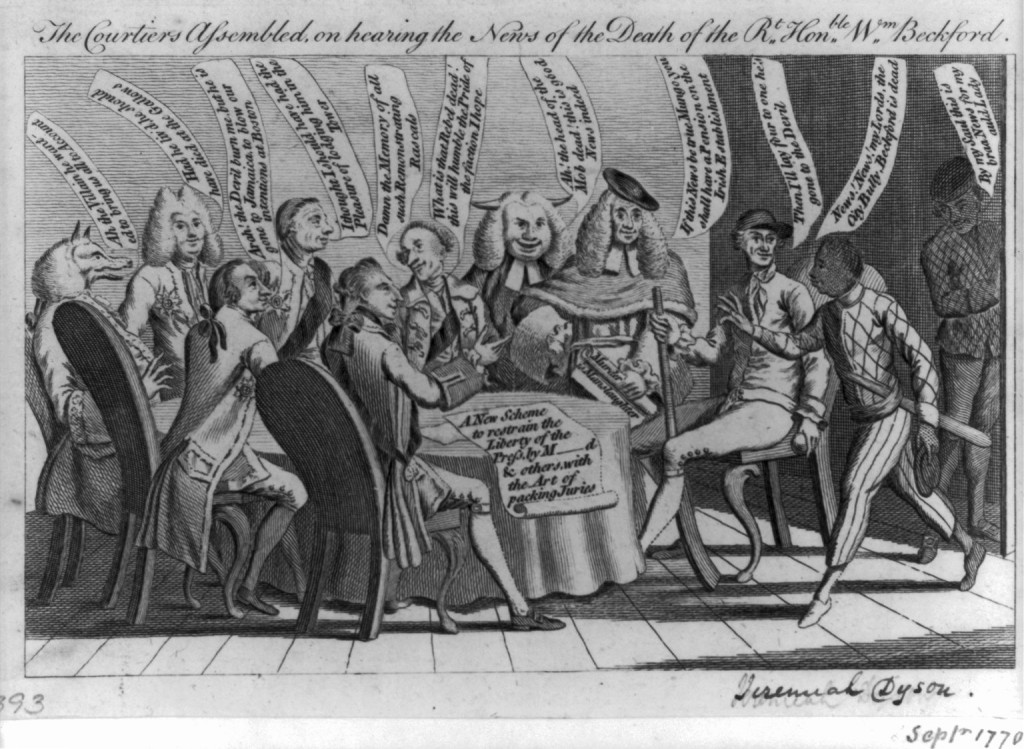
The courtiers assembled, on hearing the news of the death of the Rt. Honble. Wm. Beckford, depicting Sir Fletcher Norton (possibly the 5th figure from the right, with the horns)
This is the second of a two-part post on the recent update to the Records of London’s Livery Companies Online project. Check out Part I.
Amongst the records of the Bowyers’ Company added to ROLLCO we find the clergyman and astronomer Thomas John Hussey, DD. He was made free by patrimony of the Company in 1839, his father having been a Bowyer before him. Hussey seems to have led an altogether more retiring life than Admiral Smith, as is perhaps fitting for one of his occupation, contenting himself with his theological texts (culminating in the publication of a two volume revised edition of the Bible in the 1840s) and his privately owned telescope built at his Rectory in Hayes. Hussey’s interest in astronomy led to a wide-ranging correspondence with leading scientific, philosophical and literary figure of the day – including Charles Darwin, who didn’t seem to appreciate Hussey’s conversation – and to the publication of detailed star charts in 1831. His observations of the progress of Uranus across the skies led Hussey to theorise on the existence of a hitherto undiscovered planetary body affecting its orbit. Sadly, the leading astronomers of the day appear to have disagreed with the enthusiastic amateur, and dismissed his theories as being based on ‘observational errors’, leading Hussey to abandon his search for the hidden planet. Shortly before he joined the Bowyers’ Company, Hussey was forced to give up his hobby entirely due to some physical injury, and he sold his observatory ‘dome and all’ (Dewhirst, D.W. (1982), ‘The correspondence of the Rev. B.W.S. Vallack’, Quarterly J. Royal Astronomical Soc. 23: 552-555.). However he might have quietly enjoyed the finale of his astronomical endeavours as it was his star charts which – with the intercession of two fiercely competing scientists – led to the discovery of Neptune in 1846.
Finally we come to Sir Fletcher Norton, 1st Baron Grantley, freeman of the Girdlers’ Company and – as his freedom admission notes – “Right Honorable Speaker of the Honorable House of Commons” between 1770 and 1780. Following a well-trodden society path in the period, Norton trained as a lawyer before taking his seat as Member for Appleby. He was involved in a number of high profile political trials during the mid-eighteenth century, before being appointed as the Speaker in 1770. Throughout his political career he was known for his ‘choleric disposition’, and stirred controversy and ill-feeling during a number of run-ins with high profile political figures, including the elder Pitt and George Grenville. He certainly seems to have been no respecter of reputations. On one occasion his acerbity resulted in a six hour parliamentary session, the sole business of which was to induce Speaker Norton to apologise for harsh words he had uttered against another member (no apology was forthcoming). Norton’s moment of supreme free speech, however, occurred in the very year he was admitted to the Girdlers’ Company, 1777, when presenting for the royal assent a money bill relating to the civil list debt. This event marked a crucial turning point in his relations with the administration and his rising popularity with the opposition who were able to make political capital out of it. In the course of his speech he said that the Commons ‘have not only granted to your Majesty a large present supply, but also a great additional revenue, great beyond example; great beyond your Majesty’s highest expense’ (Cobbett, Parl. hist., 19, 1777–8, 213) (Oxford Dictionary of National Biography, http://www.oxforddnb.com/view/article/20342?docPos=1).
His popularity with government waned somewhat after this, and he spent the remainder of a long and energetic political career revelling in his opposition to the administration (and providing inspiration for satirists, who had titled him Sir Bull-Face Double Fee, “a slur on both his appearance and his integrity”).
Characters such as these three figures, well known (even infamous) in their fields and gifted with different talents, connections and visions, were members of institutions which – even in the eighteenth and nineteenth centuries – still played a hugely important role in the governance and society of London. And these men were not by any means rare cases of high profile characters within the Livery Companies – at the dinners and committees in the Livery Halls they rubbed shoulders with business leaders, royalty, generals, lawyers and courtiers, and would have felt entirely at home.
The next ROLLCO update, due in a few weeks, will feature the records of a further three Companies: the Tallow Chandlers’, the Founders’ and the Musicians’. We shall eagerly wait to see what characters emerge from these.
